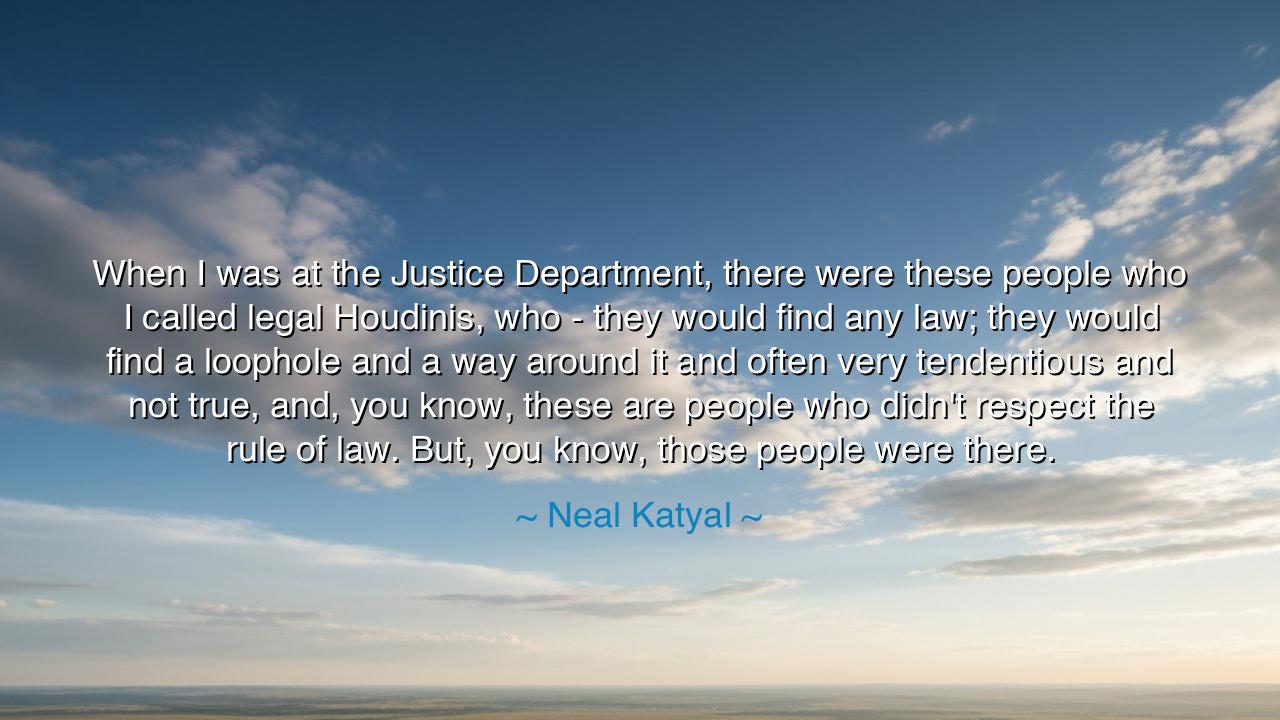
When I was at the Justice Department, there were these people who
When I was at the Justice Department, there were these people who I called legal Houdinis, who - they would find any law; they would find a loophole and a way around it and often very tendentious and not true, and, you know, these are people who didn't respect the rule of law. But, you know, those people were there.






“When I was at the Justice Department, there were these people who I called legal Houdinis, who — they would find any law; they would find a loophole and a way around it and often very tendentious and not true, and, you know, these are people who didn’t respect the rule of law. But, you know, those people were there.” Thus spoke Neal Katyal, a servant of justice, a man who had walked the corridors where power meets principle. His words shine like a lantern held over the dark corners of governance, revealing a truth as old as civilization itself: that not all who wield the law serve justice, and not all who interpret it honor its spirit.
In his phrase “legal Houdinis,” Katyal evokes the image of magicians of the mind — cunning and clever, able to twist the chains of law until they slip free, not for liberty’s sake, but for advantage. These are the men and women who see the law not as a sacred covenant but as a puzzle to be beaten, a lock to be picked. Like the illusionist Harry Houdini, they perform feats of escape — but their escapes are from ethics, from truth, from the weight of responsibility. And Katyal, with sorrow in his tone, reminds us: even within the temple of justice, such souls exist.
To understand the power of this warning, we must recall what the rule of law truly means. It is the foundation upon which all order rests — the belief that no man, however rich or mighty, stands above the law’s reach, and that no citizen, however poor, stands beneath its protection. When this foundation is respected, society flourishes; when it is corroded by deceit, all that is built upon it trembles. Katyal’s legal Houdinis are not villains of the courtroom alone — they are symbols of a deeper decay: when intellect is divorced from integrity, when cleverness is prized above conscience.
History has known many such figures. In the waning days of the Roman Republic, there were lawyers and orators who bent the law to serve the ambitions of tyrants. They twisted the statutes to justify conquest and silenced truth beneath rhetoric. Cicero, the great defender of the Republic, spoke against them, warning that “the welfare of the people is the highest law.” Yet his voice was drowned by those who saw law as a weapon, not a guide. The empire that followed gleamed in marble but rotted within, for once the spirit of law is broken, no parchment can save a nation.
Katyal’s lament is therefore not merely a recollection, but a moral parable for all who live under law. The loophole, he warns, is the serpent’s tongue in modern form — a temptation to use knowledge for self-serving ends. The tendentious argument, twisted and half-true, is the shadow that follows truth wherever men seek to control it. And those who master this dark art — the legal Houdinis of every age — are not heroes of intellect, but thieves of justice. They trade in cleverness, but they bankrupt the soul of the system they exploit.
Yet even in this somber reflection, there lies hope. For every legal Houdini, there are those who stand immovable — who, like Katyal himself, labor to restore reverence to the rule of law. They understand that the true mastery of the law lies not in bending it, but in upholding it. The wise lawyer, like the wise ruler, does not seek escape from justice but alignment with it. He knows that to preserve freedom, one must first respect the boundaries that give it shape.
The lesson, then, is clear and eternal: Do not mistake cunning for wisdom. The one who finds a loophole may gain advantage, but the one who honors the law gains virtue — and it is virtue, not victory, that sustains civilization. The measure of a just person is not how skillfully they evade constraint, but how steadfastly they uphold it. To build a lasting order, every citizen — lawyer, judge, and layman alike — must treat the law as sacred, not as a tool of convenience.
So, O listener, heed the warning of Neal Katyal. The rule of law is not a game to be played, but a light to be guarded. In every age, the temptation to twist it will arise; in every age, the duty to defend it must rise higher still. Be not a Houdini of loopholes, but a guardian of truth. For when the law is honored in spirit as well as letter, freedom endures — and the nation stands, firm as marble, luminous as justice itself.






AAdministratorAdministrator
Welcome, honored guests. Please leave a comment, we will respond soon